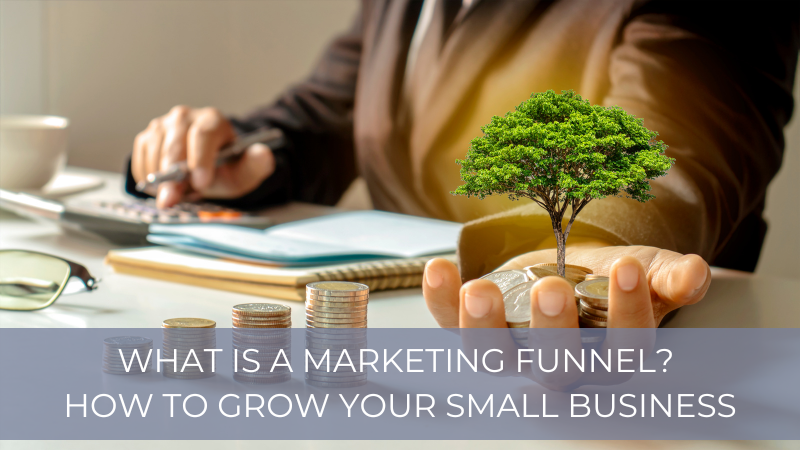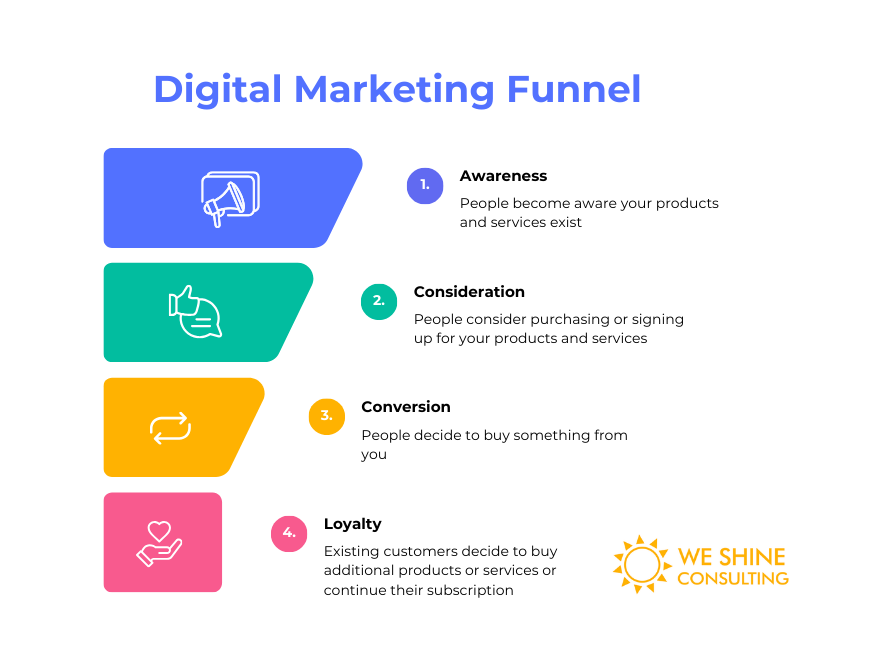Ever wondered, ‘What is a marketing funnel?’—it’s not just a buzzword; it’s a strategic roadmap that can transform the way your small business engages with and converts potential customers. This blog post will explore the concept of a marketing funnel and shed light on how it can significantly contribute to the growth of your small business.
Understanding the marketing funnel for small businesses is one key to achieving success. Let’s investigate the stages of the marketing funnel.

Understanding the Marketing Funnel
A marketing funnel serves as a visual representation of the customer journey, guiding potential customers from initial awareness to eventual conversion and loyalty. Picture a funnel-shaped diagram, narrowing down a broad audience into devoted customers. The funnel typically comprises four stages: awareness, consideration, conversion, and loyalty.

Each stage of the marketing funnel plays a crucial role in guiding potential customers from their first interaction with your brand to becoming loyal repeat customers. Let’s delve in:
1. Awareness: Casting the Net Wide
The first stage, awareness, is all about capturing attention. At this point, your goal is to make your brand known to a broad audience. Utilize social media marketing, content creation, and search engine optimization to increase visibility. Think of it as casting a wide net to draw in as many potential customers as possible.
2. Consideration: Nurturing Interest and Building Relationships
As individuals move into the consideration stage, they’ve shown an initial interest in your brand. Now it’s time to provide them with valuable content that goes beyond the surface. Engage your audience with in-depth blog posts, informative videos, and compelling lead magnets. The goal here is to nurture their interest, answer their questions, and begin building a relationship.
Let’s get meta: if you’re reading this blog post, you’re likely in the consideration stage of We Shine Consulting’s marketing funnel. You know the business exists and provides digital marketing services, but now you may be trying to figure out whether the services are worth it for your business.
3. Conversion: Sealing the Deal
The conversion stage is where potential customers transition into paying customers. Here, your focus is on demonstrating the value of your products or services. Implement strategies like targeted email campaigns, limited-time offers, personalized messaging, and 1:1 conversations to encourage a purchase decision. It’s about turning interest into action.
4. Loyalty: Turning Customers into Advocates
The journey doesn’t end with a successful conversion. In the loyalty stage, the emphasis shifts to retaining customers and turning them into advocates for your brand. Implement post-purchase engagement strategies, such as loyalty programs, personalized communication, and requests for reviews. Happy and engaged customers are more likely to become loyal advocates, driving repeat business and referrals.
Understanding each stage of the marketing funnel allows you to tailor your marketing efforts effectively. By recognizing where your audience is in the funnel, you can provide the right content and experiences to guide them seamlessly through the journey from initial awareness to becoming devoted supporters of your brand. In the next sections, we’ll explore why your small business needs a marketing funnel and how to build one tailored to your unique audience.
Why Your Small Business Needs a Marketing Funnel
Targeted Customer Journey
A digital marketing strategy based on the marketing funnel guides your potential customers through a well-defined path. Rather than employing a one-size-fits-all strategy, a funnel allows you to tailor your approach at each stage based on the specific needs and behaviors of your audience. This targeted customer journey significantly increases the likelihood of conversion.
Without a marketing funnel, potential customers might feel overwhelmed by information or uncertain about your offerings. A funnel provides a structured roadmap, making it easier for prospects to move from one stage to the next. This streamlined process not only enhances the user experience but also increases the efficiency of your marketing efforts.
Building Your Marketing Funnel
1. Identify Your Target Audience
The first step in creating an effective marketing funnel is understanding your target audience. Who are your ideal customers? What challenges do they face? Tailor your content and messaging to address their specific needs and pain points.
2. Create Compelling Content for Each Funnel Stage
Different stages of the funnel require different types of content. In the awareness stage, focus on creating attention-grabbing content that introduces your brand and its values. As prospects move through the consideration stage, provide more in-depth content that highlights the unique features and benefits of your products or services.
Measuring Success
Key Performance Indicators (KPIs) for Each Funnel Stage
To gauge the effectiveness of your marketing funnel, track key performance indicators at each stage. For the awareness stage, metrics such as website traffic, social media engagement, and brand mentions are crucial. In the consideration stage, focus on metrics like email sign-ups, content downloads, and time spent on product pages.
Tools and Analytics for Tracking Progress
Fortunately, various tools and analytics platforms are available to help you track and measure your funnel’s performance. Google Analytics, for example, provides valuable insights into website traffic and user behavior. Use these tools to identify areas for improvement and optimize your funnel accordingly.
Conclusion
A marketing funnel is a powerful tool to help your small business succeed. By understanding the stages of the funnel, tailoring your content to the needs of your audience, and measuring your progress, you can create a strategic and effective marketing plan.
Whether you’re just starting or looking to refine your existing strategy, implementing a marketing funnel is a great step toward sustainable growth for your small business. Stay tuned for our next blog post, where we’ll dive into the first two stages of the marketing funnel: awareness and consideration.

Let’s create and refine a digital marketing strategy to grow your business!